Applied Computing: Class of 2021 Special Recognition
Link to the Computer Science Special Recognition awards.
Heather Harris: Outstanding Graduating Senior
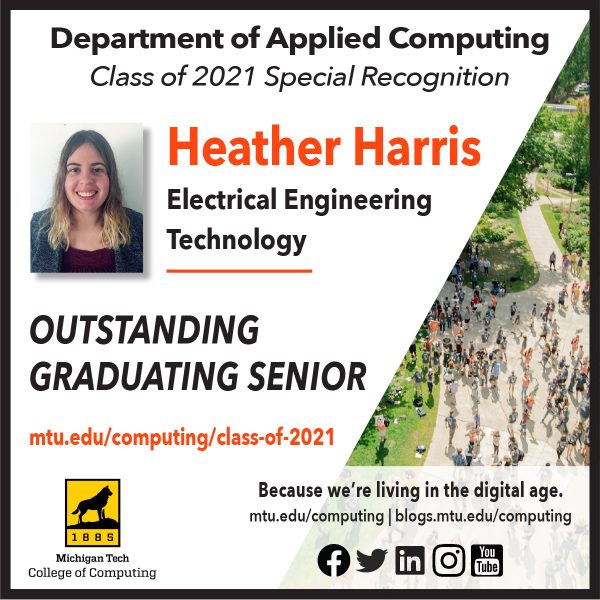
Heather has been an outstanding student ever since she has started at Michigan Tech. She was punctual, rarely missed a class, was a very active participant in class, and never missed an assignment in her EET courses. She also played a major role in the EET Senior Design swingset project. She spent a lot of time on developing the swing and addressing all the comments that were received regarding safety of the final product.
Charles Warren: Outstanding Graduating Senior
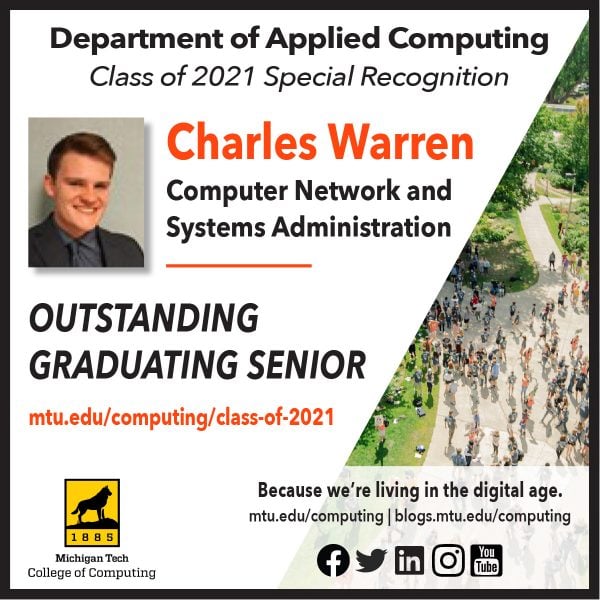
Charles was an undergraduate studying Computer Network and System Administration and a graduate student pursuing an MS in Cybersecurity. He graduated with a cumulative GPA of 3.90 and a departmental GPA of 4.0.
During his time at Michigan Tech he co-founded a student organization that focused on student-led instruction and research in networking and computing topics. It has grown into an undergraduate, graduate, and alumni organization focused on providing cloud and education services at low to no cost as a Non-profit Organization.
Charles has also been an instructor with Dr. Guy Hembroff’s State of Michigan’s Career Technical Education (CTE) funding (2018-2021), which provides local high-school students a cybersecurity curriculum at Michigan Tech.
He is currently working in Palo Alto as a Resident Engineer for security automation. He is a lifelong learner who is always looking to push the boundaries of his industry and to further his own and others’ understanding of topics in computing. His research interests include: cybersecurity, secure design, network security, public key infrastructure (PKI), and Internet of Things (IoT).
Joseph Barbercheck: Outstanding Undergraduate Teaching Assistant
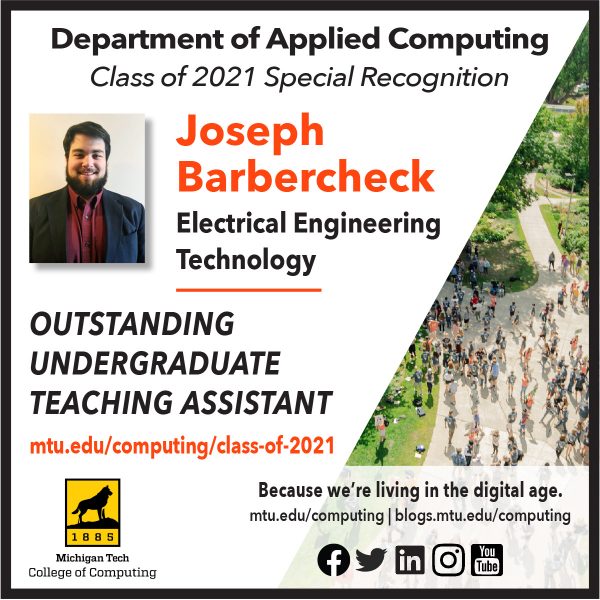
Joe has been a trustworthy and responsible teaching assistant. He has been extremely flexible and has tried his best to help everyone even outside of the scheduled lab times. If a student or a faculty needed extra help, he volunteered his time to make things work.
Besides being an excellent teaching assistant, he also took good care of equipment in the lab and performed routine maintenance tasks such as changing fuses, ordering parts, and stocking the lab with all the necessary components.
Stuart Hoxie: Outstanding Undergraduate Teaching Assistant
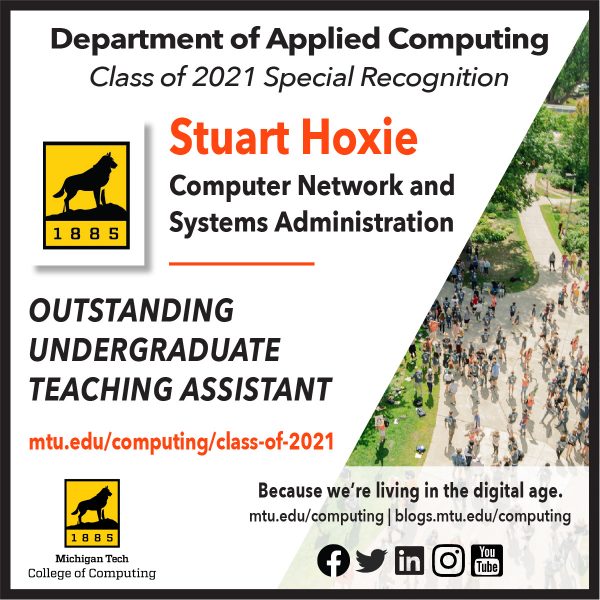
Stuart provided teaching and lab assistance during the Spring 2021 semester for our CNSA and Cybersecurity students in three classes: Microsoft System Administration, Scripting for Automation, Administration, and Security, and Cybersecurity II.
While Stuart has already proven to be a valuable team member working in groups, the Spring semester was his time to exhibit his strong work ethic while operating independently to assist students with both classroom and laboratory questions and issues.
The semester was challenging dealing with COVID and remote work, but Stuart took it in stride – remotely assisting students using the virtual cluster for labs, managing emails and the Canvas course sites, making himself available by attending Zoom meetings, all while reviewing and grading student submissions.
Stuart turned a challenging situation into one of the best semesters for both students and faculty.
Computer Science:
Class of 2021 Special Recognition
Link to the Applied Computing Special Recognition awards.
Vic Felton, Excellence in Teaching
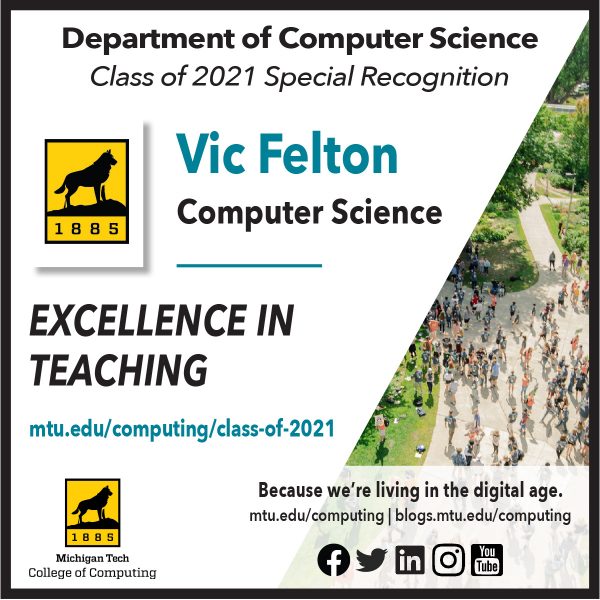
Vic was a standout Lab Assistant in the CS1121 Introduction to Programming course, helping first-time programming students one-on-one in a lab setting that was made even more challenging by COVID-related restrictions.
CS1121 instructor Prof. Briana Bettin describes Vic as “patient and persistent” and adds that his teaching style “has consistently led students to discover the answers to their own questions.”
Sarah Larkin: Excellence in Research and Teaching
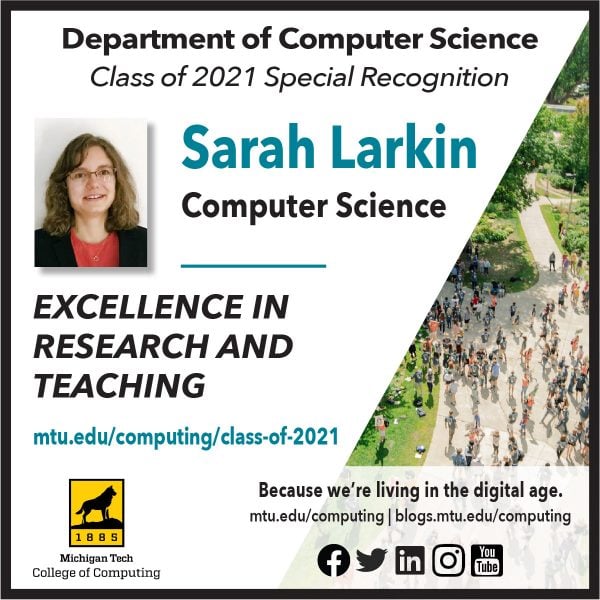
Sarah was supported by the National Science Foundation, through a Research Experiences for Undergraduates (REU) grant, on a project with Prof. Soner Onder to develop a new processor design.
Sarah was also a dedicated and effective Lab Assistant for CS1121, and a longtime contributor to K-12 computer science teaching through WiCS (Women in Computer Science), NCWIT-sponsored Aspire-IT workshops, and Copper Country Coders.
Prof. Briana Bettin says that Sarah “blends curiosity, passion, leadership, and dedication to perfection.” From prospective students and undergraduates she mentors to graduate students and faculty she works alongside, her ethics and devotion are unparalleled and unforgettable.
Alec Rospierski: Excellence in Leadership
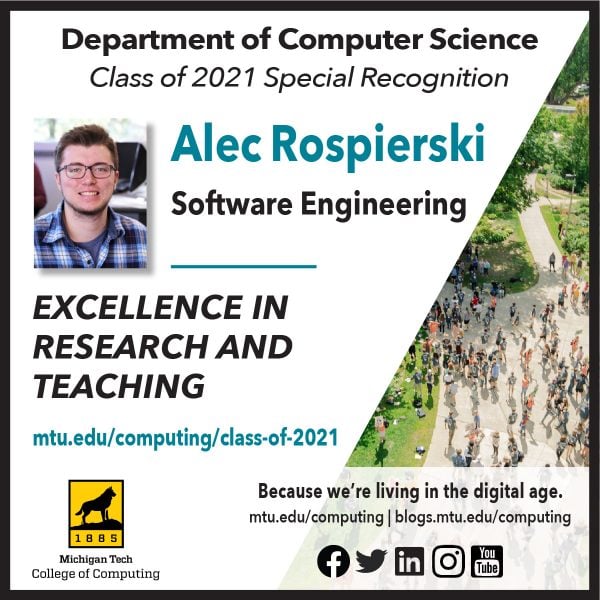
Alec led a Senior Design team in developing the Micro:bit app, allowing middle and high school students to conduct science experiments online. This project was a collaboration between Michigan Tech and Washington University in St. Louis.
He also served as team leader in the User Interface course in developing an app allowing middle and high school students to conduct simulation of the spread of COVID and other infectious diseases.
Katie Schmidt: Excellence in Leadership
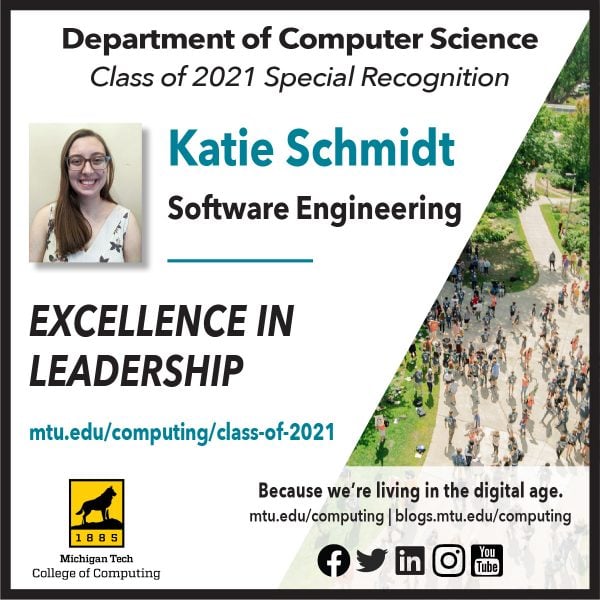
Katie served as President of the Copper Country Coders student organization. This group works with local middle and high school students, providing small-group courses in computer science and programming.
Under her leadership, Coders made great strides in developing a sustainable organizational structure, recruiting new members, and creating an engaged community of student instructors through reflection meetings and social events.
Prof. Charles Wallace, faculty co-advisor of Copper Country Coders praises “Katie’s ability to lead in an inclusive and compassionate way that inspires others.”

The 2020-2021 CTL Instructional Award for Innovative or Out of Class Teaching is being presented to two instructors, and Assistant Professor Leo Ureel, Computer Science, and Libby Meyer, senior lecturer, Visual and Performing Arts.
Ureel was nominated in recognition of his “student-centric efforts which have increased retention and diversified the cohort of first-year computing students.”
Ureel’s presentation, “Three course innovations to support communication,” will be presented at 3:30 p.m. on Thursday, February 18, 2021, as part of the CTL Instructional Award Presentation Series.
Link here to register for the event.
Ureel is a member of the Institute of Computing and Cybersystems’s (ICC) Computing Education Center.
Meyer’s presentation, “Beyond Carrots and Sticks: Mastery Based Grading and Narrative Assessment” will also be presented on February 18.
During spring 2017, academic deans were asked to begin recognizing instructors making contributions in these areas as part of the Deans’ Teaching Showcase, effectively nominating them for instructional awards.
CTL and Provost’s office members along with previous awardees then select one individual in each category from a pool composed of the Showcase and those nominated to the Academy of Teaching Excellence.
Ureel Lecture Abstract
Three course innovations to support communication Introductory courses present many communication challenges between faculty and first year students. In this context, we discuss three innovations used in our introductory computer science courses.
The first is the use of Snap, a high-level, visual programming language, as a form of pseudocode during the first five weeks of the course to build student vocabulary and problem solving skills before tackling programming in Java.
The second is a Code Critiquer developed as a Canvas plugin to provide immediate guidance and feedback to students when they submit their programming assignments.
The third is a grade visualization tool that helps students understand their current performance in the course and project a range that will contain their final grade. While not everyone teaches introductory computer science, we discuss how these or similar innovations and tools might apply to your course.
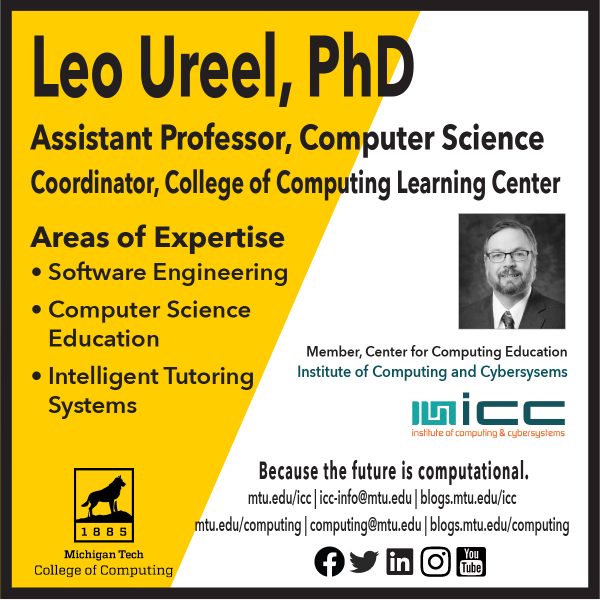
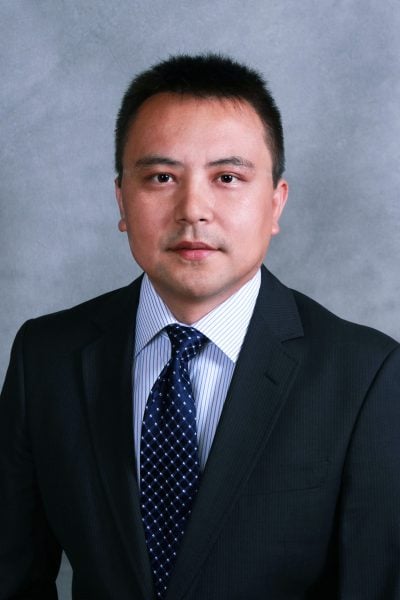
A scholarly paper co-authored by Assistant Professor Sidike Paheding, Applied Computing, is one of two papers to receive the 2020 Best Paper Award from the open-access journal Electronics, published by MDPI.
The paper presents a brief survey on the advances that have occurred in the area of Deep Learning.
Paheding is a member of the Institute of Computing and Cybersystems’ (ICC) Center for Data Sciences (DataS).
Co-authors of the article, “A State-of-the-Art Survey on Deep Learning Theory and Architectures,” are Md Zahangir Alom, Tarek M. Taha, Chris Yakopcic, Stefan Westberg, Mst Shamima Nasrin, Mahmudul Hasan, Brian C. Van Essen, Abdul A. S. Awwal, and Vijayan K. Asari. The paper was published March 5, 2019, appearing in volume 8, issue 3, page 292, of the journal.
Papers were evaluated for originality and significance, citations, and downloads. The authors receive a monetary award , a certificate, and an opportunity to publish one paper free of charge before December 31, 2021, after the normal peer review procedure.
Electronics is an international peer-reviewed open access journal on the science of electronics and its applications. It is published online semimonthly by MDPI.
MDPI, a scholarly open access publishing venue founded in 1996, publishes 310 diverse, peer-reviewed, open access journals.
Paper Abstract
In recent years, deep learning has garnered tremendous success in a variety of application domains. This new field of machine learning has been growing rapidly and has been applied to most traditional application domains, as well as some new areas that present more opportunities. Different methods have been proposed based on different categories of learning, including supervised, semi-supervised, and un-supervised learning. Experimental results show state-of-the-art performance using deep learning when compared to traditional machine learning approaches in the fields of image processing, computer vision, speech recognition, machine translation, art, medical imaging, medical information processing, robotics and control, bioinformatics, natural language processing, cybersecurity, and many others.
This survey presents a brief survey on the advances that have occurred in the area of Deep Learning (DL), starting with the Deep Neural Network (DNN). The survey goes on to cover Convolutional Neural Network (CNN), Recurrent Neural Network (RNN), including Long Short-Term Memory (LSTM) and Gated Recurrent Units (GRU), Auto-Encoder (AE), Deep Belief Network (DBN), Generative Adversarial Network (GAN), and Deep Reinforcement Learning (DRL). Additionally, we have discussed recent developments, such as advanced variant DL techniques based on these DL approaches. This work considers most of the papers published after 2012 from when the history of deep learning began.
Furthermore, DL approaches that have been explored and evaluated in different application domains are also included in this survey. We also included recently developed frameworks, SDKs, and benchmark datasets that are used for implementing and evaluating deep learning approaches. There are some surveys that have been published on DL using neural networks and a survey on Reinforcement Learning (RL). However, those papers have not discussed individual advanced techniques for training large-scale deep learning models and the recently developed method of generative models.
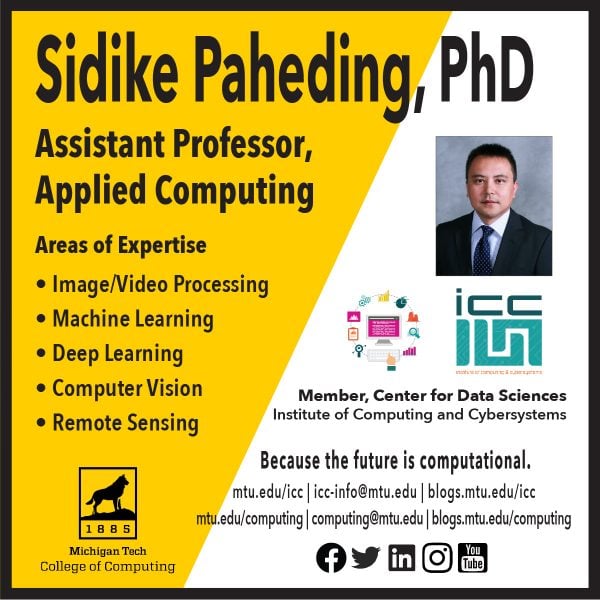
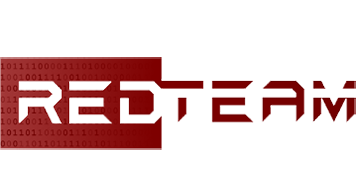
Two College of Computing RedTeam students are part of a five-member team that finished 3rd in last weekend’s invitation-only Lockheed Martin Advanced Technologies Laboratories (ATL) Capture the Flag cybersecurity competition.
The multi-day virtual event involved 200 students on 40 teams. It opened for answer submission Friday, January 8, at 8:00 p.m., and closed Sunday, January 10, at 8 p.m.
The 3rd Place team, GoBlue!, trailed the 2nd Place team by only 14 points. RedTeam members are Michigan Tech undergraduates Dakoda Patterson, Computer Science, and Trevor Hornsby, Cybersecurity, and three University of Michigan students from the RedTeam’s partnership with that institution.
Michigan Tech RedTeam faculty advisors are Professor Yu Cai, Applied Computing, and Assistant Professor Bo Chen, Computer Science.
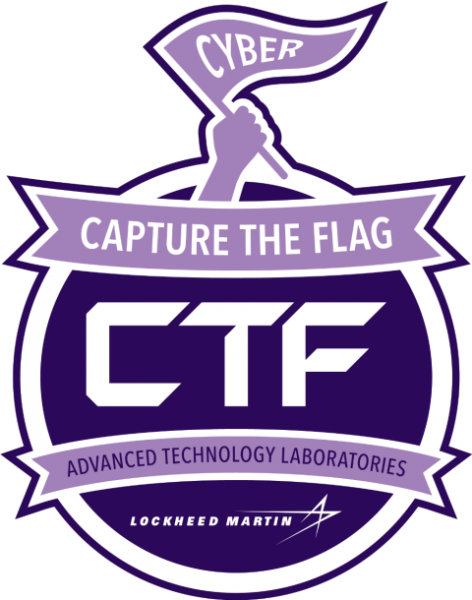
“We were lucky to be one of the 40 teams invited,” said Cai. “This was no small task, as the CTF included a large number of points in Reversing and “pwning” challenges, which proved to be fairly difficult. Other challenges were Cryptography, Stegonography, Web Exploitation, and miscellaneous challenges.”
CTF competitions place hidden “flags” in various computer systems, programs, images, messages, network traffic and other computing environments. Each individual or team is tasked with finding these flags. Participants win prizes while learning how to defend against cybersecurity attacks in a competitive and safe arena.
Top Three Teams
| Placement | Team Name | Institution | Total Points |
| 1st Place | nullbytes | George Mason University | 3697 |
| 2nd Place | ChrisSucks | George Mason University | 3330 |
| 3rd Place | GoBlue! | Michigan Tech and University of Michigan | 3316 |
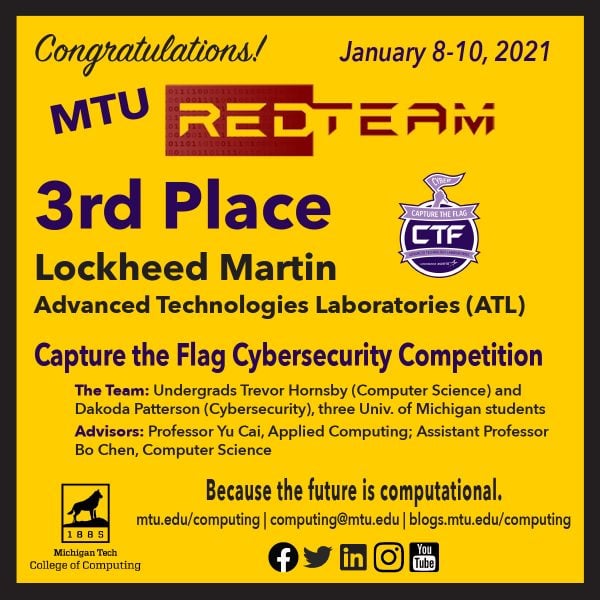
by Office of the Provost & Senior VP for Academic Affairs
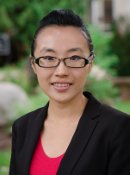
Ye “Sarah” Sun (ME-EM) has accepted the Lou and Herbert Wacker Professorship in Mechanical Engineering, which was created to retain and attract high-quality faculty who are at the top of their profession, can excite students to think beyond the classroom material, and knows how to integrate their research into the classroom.
Sun was chosen for this position as she is recognized as a rising star and outstanding researcher in the area of wearable sensors, systems, and robotics and a respected member of the smart health community.
In recognition of her innovative research in wearable sensors, Sun’s NSF CAREER award was selected for presentation to congressional offices in April 2019.
Sun is the director of the Institute of Computing and Cybersystems’s Center for Cyber-Physical Systems.
Among her research honors is the prestigious National Science Foundation (NSF) CAREER Research Award on “System-on-Cloth: A Cloud Manufacturing Framework for Embroidered Wearable Electronics.”
Sun will use this recognition and support to enhance her research in wearable and soft robotics. Her goal is to develop flexible textile robotics by leveraging the physical understanding and modeling of textile materials and dynamics and the recent advances of morphological computing.
Textile robotics are not only able to enhance human capabilities via wearable design but also achieve autonomous locomotion. The controllable structures of textiles directly provide a unified platform that is capable of integrating sensing and actuating into textile robotics itself. The positioning support will be used to recruit graduate students and to set up the manufacturing platform.
by Michael R. Meyer, Director, William G. Jackson CTL

Assistant Professor Leo Ureel, Computer Science, is among the Deans’ Teaching Showcase members who have been selected to receive 2020 CTL instructional Awards.
The awardees will make presentations next spring semester to share the work that led to their nomination.
When their presentation concludes, each will be formally recognized with a certificate and $750 in additional compensation .
Tuesday, Jan. 26, 2021 — Curriculum Development: Katrina Black, Senior Lecturer in Physics
Thursday Feb. 18, 2021 — Innovative or Out of Class Teaching: Libby Meyer, Lecturer in Visual and Performing Arts and Leo Ureel, Assistant Professor in Computer Science
Tuesday, March 30, 2021 — Large Class Teaching: Kette Thomas, Associate Professor of Diverse Literature in Humanities
These events will take place from 3:30-4:30 on the dates listed. Detailed titles, topics, and registration links for each presentation will be circulated in anticipation of each event.
Many thanks to the previous CTL instructional award recipients and the Provost’s office staff who were instrumental in the selection process.
Please consider suggesting instructors whom you’ve seen make exceptional contributions in Curriculum Development, Assessment, Innovative or Out-of-Class teaching or Large Class Teaching to the appropriate chair or dean so that they can be considered for the upcoming (2021) Deans’ Teaching Showcase during spring semester.